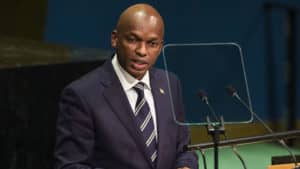by Ann Garrison
In October 2016, the tiny East African nation of Burundi made history by raising an independent head against U.S. empire. Its legislature voted to withdraw from membership in the International Criminal Court, a tool that the U.S. and its Western allies use to discipline unruly African leaders – especially those who sign resource extraction contracts with Russia or China and/or those who try to do anything for their own people. The Burundian government fits both descriptions.

President Pierre Nkurunziza signed the legislation, and Foreign Minister Alain Nyamitwe announced that Burundi had formally submitted its intent to withdraw to then Secretary General Ban Ki-Moon. Human Rights Watch wailed that Burundi had “taken a major step backward” and urged other African ICC members to “distance themselves from Burundi’s withdrawal and affirm their support for justice for victims of the gravest crimes.” Instead, South Africa and Gambia announced their intent to withdraw, a handful of other African nations rumbled that they might as well, and the Western press sounded alarms about a mass exodus.
President Pierre Nkurunziza signed the legislation, and Foreign Minister Alain Nyamitwe announced that Burundi had formally submitted its intent to withdraw to then Secretary General Ban Ki-Moon.
Now, almost a year later, a United Nations Commission of Inquiry is urging the ICC to indict officials of the Burundian government for crimes against humanity “as soon as possible,” but Russia, China, and the African Union so oppose an indictment that it could cost the court what little political legitimacy it has left.
Why the hurry? The U.S. and allies are trying to beat the October 27 deadline when Burundi will have made its way out from under the court’s imperial jurisdiction. After the one-year anniversary of its submission of formal intent to withdraw, the ICC will no longer have the authority to indict Burundian officials or issue international arrest warrants for them.
After October 27, only the United Nations Security Council (UNSC) can restore the court’s authority to open a case against Burundi, and Russia, China or both would most likely veto any resolution to do so. Both have firmly defended Burundi’s national sovereignty since President Pierre Nkurunziza was re-elected in 2015, despite the shrill, ongoing demonization campaigns waged by Western press and the interventionist NGO lobby – the Enough Project to Counter Genocide and Crimes against Humanity, the Student Led Movement to End Mass Atrocities (STAND), the Aegis Trust, the International Federation for Human Rights (FIDH), United to End Genocide, Fortify Rights, the National Holocaust Museum, Jewish World Watch, Avaaz etc.
Now, almost a year later, a United Nations Commission of Inquiry is urging the ICC to indict officials of the Burundian government for crimes against humanity “as soon as possible.” Why the hurry?
FIDH may have produced the most lurid campaign piece yet, a 56-second video in which children race through a lush African landscape screaming in terror until the concluding text appears: “Genocide in Burundi, a Film by Pierre Nkurunziza. #StopThisMovie.”
This plurality of seemingly grassroots human rights NGOs has seen major mergers in recent years; United to End Genocide and Fortify Rights, for example, have joined the Enough Project, and the Student Led Movement to End Mass Atrocities has joined the Aegis Trust. Consolidation is no threat to diversity of expression, however; the human rights rage of these NGOs couldn’t get more uniform than it’s already been.
Like the U.N. Human Rights Commission itself, they obsess over the same human rights that the U.S. government obsesses over. The 1 million Rohingya of Myanmar are at the top of all of their lists at the moment, but Burundi, Sudan, South Sudan, Syria and the Democratic Republic of the Congo are all close behind.
Israel does not make their lists of human rights offenders; Palestinians do not make their lists of victims. They could all reduce bureaucratic redundancy and inefficiency by merging under one big umbrella in Washington, D.C., and renaming themselves the Pentagon Human Rights Auxiliary.
Is the Burundian government guilty of human rights abuse? No doubt; soldiers and military police have been far more visible in the city’s capital, Bujumbura, ever since Gen. Godfried Niyombare mounted a failed coup attempt in 2015. Any government’s response to a violent attempt to overthrow it are all but certain to be heightened militarization and repression.
Is the Burundian government guilty of human rights abuse?
Since the coup attempt in Burundi, top government and military officials have been assassinated and President Nkurunziza’s top aide, Willy Nyamitwe, survived an assassination attempt that took the life of his bodyguard. Mortars have even been fired close to the presidential palace, and anyone who knows recent Rwandan and Burundian history knows how catastrophic the assassination of President Nkurunziza would be.
The 1994 massacres known as the Rwandan Genocide were preceded by the assassination of Burundi’s first Hutu president, Melchior Ndadaye, on Oct. 21, 1993, followed by the Tutsi-dominated Burundian army’s massacre of hundreds of thousands of Hutu civilians, and then by the assassination of both Rwandan and Burundian Hutu presidents in Rwanda on April 6, 1994.
The U.N. Human Rights Commission is either unaware or unconcerned with this past and recent history. Its report mentions neither. Nor does it mention longstanding U.S. ally and military partner Rwanda’s well documented efforts to conscript Burundian refugees into a rebel army to return and overthrow President Nkurunziza.
Kagame would love nothing more than a chance to replay his role in 1990s Rwanda, when he invaded from Uganda, massacred his way to Kigali, triggered mass panic and violence by assassinating a Hutu president, overthrew a majority Hutu government, planted an American flag, declared English the official language of business, then claimed to be the country’s savior who’d stopped a genocide.
Oakland writer Ann Garrison writes for the San Francisco Bay View, Black Agenda Report, Black Star News, Counterpunch and her own website, Ann Garrison, and produces for AfrobeatRadio on WBAI-NYC, KPFA Evening News, KPFA Flashpoints and for her own YouTube Channel, AnnieGetYourGang. She can be reached at anniegarrison@gmail.com. In March 2014 she was awarded the Victoire Ingabire Umuhoza Democracy and Peace Prize for promoting peace in the Great Lakes Region of Africa through her reporting.





